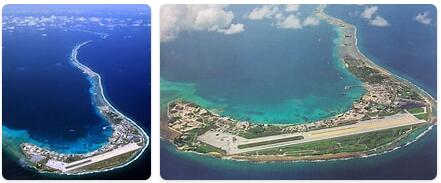The Covid-19 pandemic has so far led to a delay in entry for all foreign travelers, and planned trips to the Marshall Islands must therefore be postponed or canceled. For more information, see the entry entry.
Safety
Norwegian citizens staying for a shorter or longer period of time in the Marshall Islands are encouraged to register on www.reiseregistrering.no, and to ensure that they have valid travel insurance.
The Marshall Islands consists of 29 coral atolls and five islands that are spread over a very large sea area. The range of services, not least the possibilities for medical assistance, varies greatly, and travelers are advised to familiarize themselves with the local conditions in which they will be staying.
The greatest danger to travelers is likely to be car or boat accidents. The road standard varies and in the case of car transport one should drive slowly and carefully. Some drive in an alcohol-affected state and may pose a danger to others. When traveling by boat, including ferries between the many islands, travelers should be aware that the Marshall Islands have very limited capacity for search and rescue.
There are many unexploded bombs from World War II both on land and in the sea in the Marshall Islands, and travelers are encouraged to exercise caution.
Although the Marshall Islands are not particularly susceptible to natural disasters, the archipelago’s low location makes it affected by heavy rainfall, strong winds and floods from storms in the region. Particular caution should be exercised in May to November, as the amount of rainfall increases and roads are often flooded.
The risk of terrorist incidents in the Marshall Islands is considered low.
There is low crime in the Marshall Islands, but alcohol-related episodes of violence occur at bars and night spots. Sexual harassment of female travelers occurs, and female travelers should consider refraining from using taxis alone, as well as going out alone after dark.
Homosexuality is legal in the Marshall Islands, but conservative attitudes in society make it not common to show love in public.
Marshall Islands does not have a national emergency number, and travelers are encouraged to inquire with their hotel or travel operator about contact numbers for local police and health services. Local police can be reached at +692 625 8666 or +692 625 3233.
In case of crisis or emergency, you can contact the Ministry of Foreign Affairs’ 24-hour operating center on tel. +47 23 95 00 00 or e-mail UDops@mfa.no.

Entry
Coronavirus (covid-19: the covid-19 pandemic has so far led to a delay in entry for all foreign travelers, and planned trips to the Marshall Islands must therefore be postponed or canceled.
It is the traveler’s own responsibility to ensure that travel documents are valid for entry and to familiarize themselves with the current entry regulations to each country. Please note that entry regulations may change at short notice. The information below is intended to be indicative only, and the Ministry of Foreign Affairs is not responsible if parts of the information should turn out not to be the result of changes. Only passports are accepted as identification documents.
Norwegians need a visa to enter the Marshall Islands, but can get a visa on arrival and therefore do not need to apply in advance. Passport must be valid for at least six months after departure. You must also be able to document that you have a valid exit ticket. The visa fee is one hundred US dollars (USD 100) and it is recommended to bring this sum in cash.
Travelers are required to show evidence that they have a vaccine against yellow fever, measles and influenza upon entry.
Most travelers arrive in the Marshall Islands by plane via either Hawaii or Guam/Micronesia. Both involve flight exchanges on US territory. Travelers must therefore ensure that they have the necessary permits to be able to stop in the US.
Health
There are basic health services in Majuro and Ebeye, and there are also smaller clinics on the most populated islands. In several of the smaller islands, there is no medical help at all. For specialist health services, one must either to Hawaii or Guam. In case of acute illness, it can take a long time for good help.
The US Center for Disease Control and Prevention recommends measles, hepatitis A and B vaccine and typhoid vaccine for travelers to Micronesia. See Vaccines and medicines for more information.
Micronesia authorities can also ask travelers for documentation that they have a vaccine against yellow fever, measles and influenza upon entry.
There is an ongoing outbreak of dengue fever in the Marshall Islands. This is a mosquito-borne disease, and travelers are encouraged to take precautions to avoid being bitten by mosquitoes.
The tap water should not be drunk on the Marshall Islands, nor used to brush teeth
Practical information
Marshallese and English are the official languages of the Marshall Islands. Larger hotels and businesses accept credit cards, but cash in hand is recommended. Marshall Islands uses US dollars as its currency.
Marshall Islands is ten hours ahead of Norway during summer, eleven hours in winter.
According to allcitycodes, the area code for calls from Norway to Marshall Islands is +692. Some hotels offer wifi access. Mobile coverage is adequate on the most populated islands, but mobile broadband (roaming) cannot, as a rule, be used.
All land in the Marshall Islands is owned by someone, so it may be required with permission for travel and use of islands, beaches and the like.
110/120 volts is standard for electrical outlets.
The Marshall Islands have tropical climates and the average temperature is 27 degrees. It rains a lot from May to November.